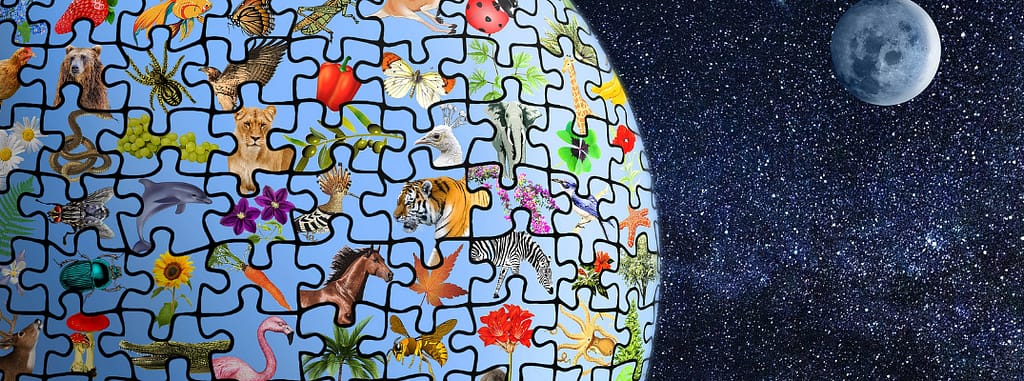“A compulsive fast, you say?!”
Yes sir/ma, a compulsive fast. Like, a ‘by force’ fast. And we all know how hard a well-planned fast is; talk less of a compulsive one. I even forgot to mention, it is most likely going to be a dry fast – no food, no water.
“Okay. But why? And what exactly does biodiversity have to do with this?!”
Oh, it has a whole lot to do with it. But first, let’s start by understanding what Biodiversity is.
Biodiversity, simply put, is the web of life. It is the link between all organisms on earth and it binds each organism into an interdependent ecosystem. And for the ecosystem to run smoothly, all species have and must play an individual role.
“This is some scientific jargon. Please, how do I, as a human being, come in?”
We, as humans, alongside plants, animals, water, land, and the atmosphere all form part of the earth’s ecosystem. The daily survival/livelihood of nations, communities, families and future generations greatly depend on Biodiversity because it is a resource. Therefore our health and well-being are at a huge risk if a biodiversity crisis occurs.
“Oh, I see. So Biodiversity is quite important. Okay…”
Quite? More like it is very important. For example, a larger number of species leads to more variety of crops, a healthy ecosystem has the ability to resist and recover from various disasters, and a greater diversity of species guarantees natural sustainability for all life forms.
Also, Biodiversity and Ecosystem Services go together like Lagos and traffic.
(Source: www.nsf.gov)
“Ecosystem Services?”
These are the natural services provided for everyone by a healthy biodiversity. They include soil formation and protection, protection of water resources, maintenance of ecosystems, nutrient storage and recycling, recovery from unpredictable events, and contribution to climate stability. All of these lead to biological resources such as food, wood products, ornamental plants, medical resources and pharmaceutical drugs, and future resources. They also lead to social benefits such as cultural values, research, education and monitoring, and recreation and tourism.
So it is clear how important Biodiversity is to us and the health of the planet. A reduced Biodiversity means we are facing a future in which food supplies are susceptible to pests and diseases, and fresh water being irregular or in short supply.
(Source: app.emaze.com)
“Wow. Now I get what you mean by the dry fast. But how imminent and compulsive is it though?”
According to WWF Global, we are currently using 25% more natural resources than the earth can sustain. This use greatly endangers species, habitats and local communities. Also, in terms of food security, approximately 100 million metric tonnes of fish, crustaceans and molluscs are taken from the wild annually. Many countries already experiencing high rates of food insecurity and poverty are at risk of losing meat from wild animals which contributes to food sources and livelihoods. In the last 35 years, Biodiversity has declined by more than a quarter. The Living Planet Index (LPI) shows a decline of 52% in biodiversity loss between 1970 and 2010.
(Source: theconservation.com)
“Wait. ‘Taken?’ ‘Using?’ How exactly are these happening? What exactly are the causes of biodiversity loss at this alarming rate?
Generally, population growth and our uncontrolled consumption of natural resources are causes for this great loss. Specifically, trade of wildlife and destruction of habitats (via deforestation) are the main causes of biodiversity loss. As humans, we have over-exploited the natural resources by hunting animals (and fish), logging trees, plucking flowers for food, medicine, building materials, souvenirs, etc. These practices are unsustainable. Climate change is also a major cause of biodiversity loss.
(Source: Greenpeace)
“We are the major cause? Oh my, the impacts of the imminent ‘dry fast’ look scary.”
Yes, the impacts are quite frightening. Loss of biodiversity can significantly and directly affect human health if the ecosystem services aforementioned are dysfunctional as the basic social needs of human won’t be met. We are indirectly affected when there is an alteration in ecosystem services which affects income, livelihood, local migration, and political conflict. Important pharmacological and medical discoveries and inventions are also affected because they are made through the comprehension of biodiversity, therefore biodiversity loss would limit the discovery of possible treatment/solutions for various health problems and diseases.
“My goodness! Please how can I play my part in reducing or stopping biodiversity loss?”
By:
- Saving our forests by purchasing good wood. You can question where your wood flooring and garden furniture come from. In doing this, you can put a stop to illegal logging and encourage the wood suppliers doing the right thing. You can also save the forest by reducing your paper consumption and using recycled paper because the use of 100% recycled paper saves 24 trees per tonne of paper.
- Purchasing sustainable seafoods. You can do this by choosing fishes which are sustainable while at a restaurant or at home.
- Being good to the climate. There are many guides on how to tackle climate change as individuals on the SustyVibes website. Check them out.
- Not buying bad souvenirs. Bad souvenirs are basically souvenirs made from the skin, bone, fur, beak, hooves or shell of an endangered species. Buying such souvenirs indirectly means you are supporting or encouraging the killer of the endangered species to continue such an inhumane action. Refusing to buy these souvenirs encourages the local suppliers to provide only legal and sustainable products.
There are more things to be done to stop/reduce biodiversity loss. You should check out more on all I have written on Biodiversity here:





